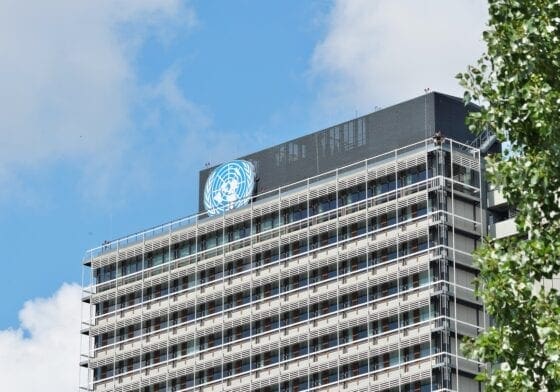 The four most powerful words in the English language. Because everyone loves a good story.
The four most powerful words in the English language. Because everyone loves a good story.
Once upon a time, following the debacle of World War II, several leading countries came together to form a new international organization. The League of Nations had come and gone. But the need for a platform, an organized way for nations to meet and discuss common issues, especially those of war and peace, was readily apparent. And so the United Nations was born 75 years ago, October 24, 1945 in San Francisco, with a charter that begins “We the People.”
So as we close out this anniversary year, marked by, at the insistence of the Secretary-General, shared reflection more than celebration, a critical and hopeful look at the organization seems appropriate.
Critics frequently cite infuriatingly slow and complex procedures at the UN, its bureaucracy, its tendency to discuss issues over and over, without actually achieving significant change. The organization is also criticized for the platform it provides for nations to sign documents and statements at elaborate photo ops without much meaningful follow-up. Showboating and hypocrisy are undeniable. And while much of that is true, it is not the full story.
Why so complex and slow? With 192 countries, multiple cultures and languages, and a myriad of interests/issues, how quickly could anything be done?
In its defense, the Organization does not have the power to enforce its decisions, much less control what countries, or “Member States” in official language, choose to do. Then too the Security Council has a glaring weakness: there is no membership for the real global powers of today, like Japan or India; reform here seems immensely difficult. And with the current unfortunate rise of extreme nationalism in many parts of the world, collective partnership is sorely threatened, and with it solidarity and action for the common good.
But the United Nations does serve as an invaluable global forum where countries can discuss and act on pressing issues, war and peace certainly, and in addition the UN protects human rights, delivers humanitarian aid, fights extreme poverty, addresses climate change, promotes sustainable development and upholds international law. A sweeping agenda and an open one as well—the UN now also responds to COVID19.
It is important to remember that the UN is not an end in itself, but a means of achieving common goals. In his work Politics and Process at the UN, Courtney B. Smith uses the subtitle The Global Dance and argues that
“The strength and effectiveness of the Organization depends on the active support of its Member States and their policies…..The UN brings diverse actors together in a complex routine of procedures and practices where each seeks to shift the music so that the process is moving towards outcomes it prefers. Some strut, others inspire, and a few just remain on the sidelines, but the hope is that the number of participants willing to dance to the same music will increase over time, to the end that effective solutions to pressing global problems can be found.”
Dag Hammarskjold, a celebrated former Secretary-General, reminds us the UN “was not created to take humanity to heaven, but to save humanity from hell.” Left to themselves countries drift into dangerous antagonism, and without a multilateral effort, old problems are likely to deepen. Pope Francis says that the UN is an “obligatory reference point of justice and a channel of peace.”
There really is no alternative to the UN. If it didn’t exist, we would have to invent it. The challenge is to help it live up to expectations. In a true sense, WE are the UN. It’s all about us and the future of People and Planet. Let’s help it dance to the same music, that of the universal common good.
Let’s give this story a happy ending. And so we might:
- Pray that the UN fulfill its promise for the good of all humankind;
- Connect with the UN Agenda, and learn about the 2030 Agenda for People and Planet in the form of the 17 Sustainable Development Goals, at first glance a utopian dream but utterly doable if nations collaborate for the common good. Use the various Vincentian Family websites to learn more; for the CM, congregationofthemission-un-ngo.com;
- Join in advocacy efforts with other Vincentians on issues related to our charism, at this time especially homelessness.
Respectfully Submitted,
James E. Claffey
NGO representative of the CM @ the UN
www.congregationofthemission-un-ngo.com
FB: congregation of the mission at the UN
Twitter: @cmunnyc

